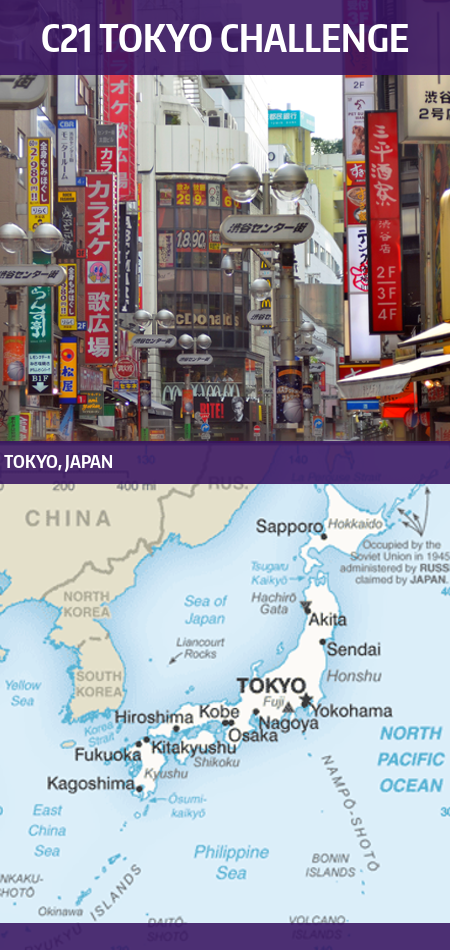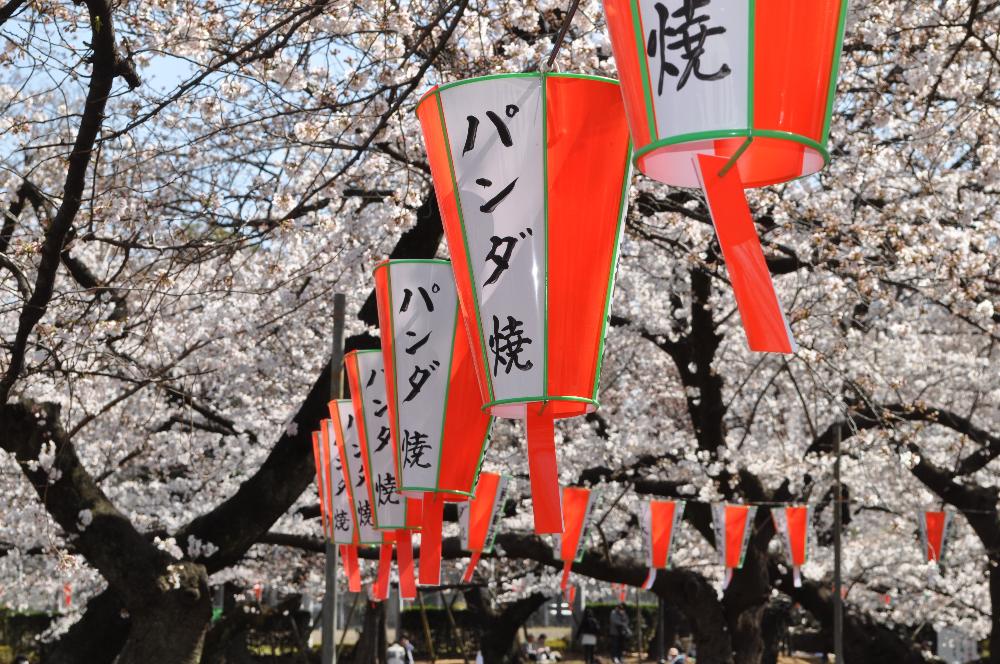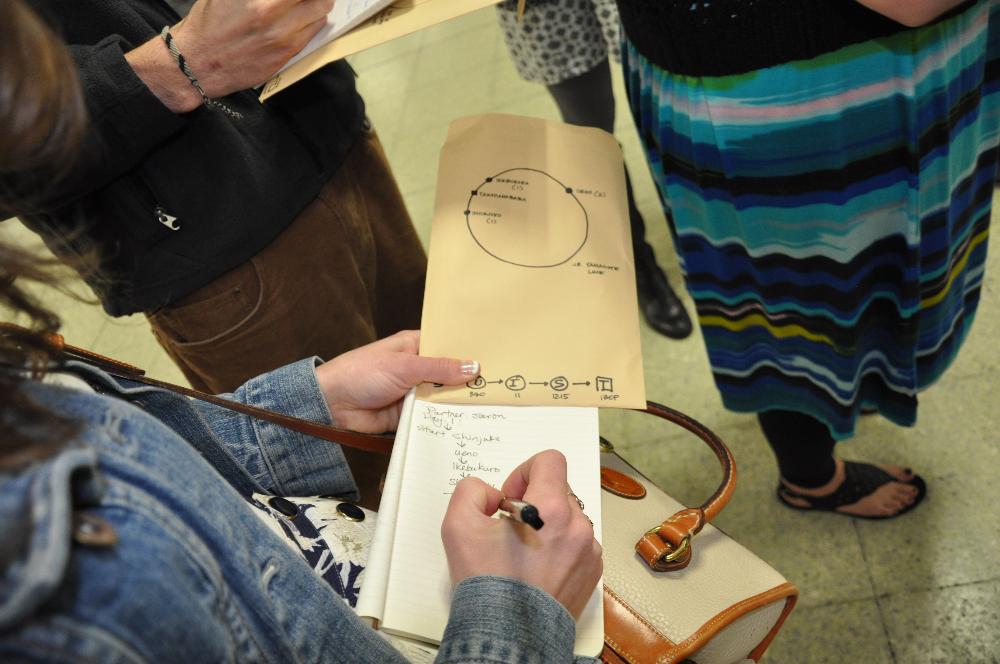
| |
QUICK FACTS |
| Location |
Tokyo, Japan |
Academic
Term |
Summer B Term |
| July 22 – August 12, 2016 (with additional post-programmatic online academic work 8/15 - 8/19) |
| Estimated Program Fee |
$2,675 |
| Credits |
6 credits |
| Prerequisites |
There are no prerequisites for this program. Participants will be invited to attend C21 activities throughout the 2016-2017 academic year. More information can be found in the Academics section below. |
| Program Directors |
Kevin Mihata & Michael Shapiro (College of Arts & Sciences); Andrew Tsao (Drama) |
| Program Manager |
Ruby Machado| studyabroad@uw.edu |
| Application Deadline |
February 15, 2016 |
| Information Session(s) |
Monday 1/11 5PM in CMU 126
Tuesday 1/26 5PM in CMU 126 |
Website/
Facebook |
http://artsci.washington.edu/c21
https://www.facebook.com/C21TokyoChallenge/ |
| |
HIGHLIGHTS |
| General |
This program will create an environment where students can explore their own curiosities and interests within a safe urban metropolis while they practice their skills in a series of problem-solving projects that take them out into Tokyo to explore a range of content, from history to food to culture to science to politics. |
Read
More
About |
Where You Will Study
Academics
Expenses, Financial Aid, & Scholarships
Application
Orientation |
Program Description
The Center for 21st Century Liberal Learning (C21) is excited to return to Tokyo, Japan for another immersive program for summer 2016! We have assembled a fantastic team of educators from diverse disciplines to help students approach applied learning through multiple academic lenses. We will create an environment where students can explore their own curiosities and interests within a safe urban metropolis while they practice their skills in a series of problem-solving projects that take them out into Tokyo to explore a range of content, from history to food to culture to science to politics. To augment this group work, we hope to partner with students and faculty from Waseda University while in Tokyo.
The goal is not to learn about a given topic for its own sake. Instead, we are using the diverse content of Japan to find broader, more universal themes that tie the particulars together. The physical structures tell us something about Tokyo, but what do they tell us about history or sociology or art more generally? What can the rhythm of daily life in Tokyo tell us about our own priorities of work, of family, of culture? Rather than trying to answer all of these questions, we will emphasize and practice the work of connection, because this is the central intellectual skill of a student’s academic career and a citizen’s life work.
One of the main goals of international education is to leverage the feature of disruption – interrupting the everyday “normal” way of life in order to see more clearly our assumptions about the world in which we live. For this, Japan is an ideal location. The relative lack of crime and ease of movement within and throughout Tokyo will provide an environment of support for this challenging and important intellectual work. As we have done in previous abroad programming, we will take advantage of the expertise of subject experts to provide context for the location. Drawing upon our academics’ deep knowledge of sociology, drama, and religion, we will take a generalist approach to the culture of Japan to provide context for its exploration, integrating each area of knowledge with each Fellow’s personal story.
Foundational program goals:
- First, students will have an immersive review of what it means to be a 21st century university student – someone deeply involved in intellectual engagement while continuously seeking connection to the local and global world outside the university. Students will develop their understanding of what engagement looks like in the C21 context, building a community of multidisciplinary learners.
- Second, students will continue to develop the skills at the heart of an arts and sciences education – the same skills we know are central to the newly emerging careers and fields our graduates will lead and discover. These include: collaborating for creative problem-solving; drawing connections across disciplines and topics; embracing intellectual risk, learning from failure; defining problems, imagining solutions, and building and leading communities to implement those solutions.
- Last but not least, students will model for one another the articulation of a coherent story of their learning that will develop and change throughout their lives – tying this narrative to their goals and aspiration for purpose as a student, citizen, and member of the workforce.

C21 Program
What is C21? The Center for 21st Century Liberal Learning represents an investment by the College of Arts & Sciences to discover a new kind of learning for the 21st century. Through regular ongoing dialogue, experimental pilot projects, and collaborative partnerships, we seek to push the boundaries of traditional learning models to better meet the contexts of a rapidly changing world.
Our mission is to build an intentional learning community that sustains undergraduates throughout their college careers, bringing together the research strengths of a first-class university with students’ interests in creating valuable real-world contributions. We imagine a place where students experience what it means to be a citizen and colleague not by listening to us tell them, but by solving difficult problems together; where they learn that the power of ideas lies not in their memorization, but in their enactment; where they see that innovation comes not simply from individual genius, nor leadership from individual skill, but that both emerge through participation in a collective enterprise.
Benefits of membership: C21 Fellows gain front-row access to cross-campus leadership in the College of Arts & Sciences, Career Center, and Undergraduate Academic Affairs.
The Fellows program includes:
- Intensive orientation to the practice of liberal learning. Students explore their surroundings and pursue student-led projects, while getting to know each other and College of Arts and Sciences leadership.
- Small, mentor-led communities. A network of faculty, staff, and advisors engage Fellows in their learning, helping to integrate their studies and other high-impact learning experiences.
- College-to-career connections. The C21 Fellows Program is integrated into the College of Arts & Sciences Education to Employment initiatives to share with Fellows career development initiatives and foster deeper connections with outside employers.
- Applied learning experiences. Applied learning experiences. Students will engage in real-world projects to develop career skills that today’s employers seek. C21 Fellows have access to a large staff of advisors and educators dedicated to their development, encouraging exploration and introspection. We help students to think deeply about the skills that a liberal arts education brings to students post-graduation and throughout their lives.
Location
Tokyo, Japan
Housing
National Olympics Memorial Youth Center of Tokyo
Academics
Pre-Requisites/Language Requirements
The program is specifically designed for C21 Fellows, those students who have participated in programming associated with the College of Arts & Sciences Education to Employment initiatives, and other uniquely qualified UW undergraduate applicants.
For participants on the program who are not already Fellows, the Tokyo Challenge will act as an entry point into the C21 Fellowship. All Fellows, both new and established, will participate in C21 activities throughout the 2016-2017 academic year.
There are no academic course prerequisites for the program. We will preference applicants who have exposure to C21 methods and practices, an interest in going deeper with these methods and practices, and/or a deep interest in having both. Though it would be helpful, students do not need a background in Japanese language to attend.
Students will be walking daily and extensively in an urban environment, touring the city on foot.
Credits
6 credits
Courses
ARTSCI 300 (6 credits)
The course is made up of intensive, team based project work developing intentional, creative, collaborative problem solving skills of arts and sciences.

Program Directors & Staff
Kevin Mihata, College of Arts and Sciences, Program Director
As Associate Dean for Educational Programs, Kevin works to coordinate undergraduate education across all four divisions of the College of Arts and Sciences. He is also the founding director of C21, the A&S laboratory for new practices and models in liberal education. In 2000, he received his Ph.D. in Sociology at UW, and has taught courses in sociological theory and methods, the sociology of culture, and social psychology. This is his fourth year leading a C21 Fellows Program abroad.
kmihata@uw.edu
Michael Shapiro, College of Arts and Sciences, Program Co-Director
A Professor of Asian Languages and Literature and Adjunct Professor of Linguistics, Mike has served as divisional dean of humanities since January 2012. He also served as chair of the Department of Asian Languages and Literature from 1992 to 1997 and from 2005 to 2010. A specialist in South Asian languages, his teaching and research deal with the linguistic structures of Hindi and related languages, as well as with the analysis and interpretation of works of Indian literature.
hindimcs@uw.edu
Andrew Tsao, Department of Drama, Program Co-Director
Andrew Tsao is an associate professor of dramatic arts at the University of Washington School of Drama where he heads the undergraduate drama program, leads summer drama programs at the Edinburgh Festival and is the artistic director of The Drama Collective, a European theatre studies creative lab in Europe. Over the course of his career, he has directed numerous theatrical productions in regional theatres and off-Broadway, and in Europe. He also has a long career in prime-time television, directing dozens of episodes.
tsao@uw.edu
Program Expenses
Cost: $2,675
Estimated Program Fee of $2,675, the UW Study Abroad Fee ($325), airfare, UW Study Abroad Insurance ($62/month), other health expenses/immunizations and personal spending money.
Average Airplane Ticket Price
$1,800 - $2,000* roundtrip
*Subject to when & where you buy your ticket
Payment Schedule
Program fees will be posted to your MyUW student account and can be paid the same way that you pay tuition and other fees. Check your MyUW Account periodically for due dates.
| Payment Type |
Payment Amount |
Payment Due Date |
| Non-Refundable Study Abroad Fee |
$325 |
July 8, 2016 |
| Program Fee Balance |
$2,675 |
July 8, 2016 |
| TOTAL FEES CHARGED |
$3,000 |
- |

Orientation
To be eligible to study abroad, all program participants must attend an in-person pre-departure orientation facilitated by the Study Abroad office as well as your program-specific orientations, offered by your program director.
You must register for orientation through your online study abroad account in order to attend scheduled orientations. You can visit the Orientation section of our website to view the current orientation schedule.
Orientation must be completed prior to the enrollment deadline for the quarter that you are studying abroad.
Financial Aid and Scholarships
Most forms of financial aid can be applied to study abroad. You can verify that your financial aid award will apply to your program costs by contacting the Financial Aid Office. Financial aid or scholarships awarded as tuition waivers or tuition exemptions might not apply so you will need to verify that these funds are eligible for use with study abroad by contacting the funding office.
Financial aid and most scholarships are disbursed according to the UW academic calendar (at the beginning of the quarter). If your program starts before the start of the UW quarter, your financial aid will not be available to you prior to your departure. If your program starts after the first day of the quarter, your financial aid will be disbursed at the start of the program. In either of these cases, you will have to finance any upfront costs such as airfare, health insurance and the start of your time abroad on your own. Please take this into consideration when you are making plans.
Revision Request
In some instances you may qualify for an increase in your financial aid award (typically in loan funds). Check with the Financial Aid Office about your options. To request a revision in your aid, you will need to submit the following paperwork to the Financial Aid Office:
- Revision Request Form
- Summer Application for Financial Aid
- Budget of student expenses for your program: The UW Study Abroad Office will upload this budget to your study abroad account after a signed contract has been submitted to the UW Study Abroad Office. You can request an unofficial copy of this budget by emailing studyabroad@uw.edu.
Visit the Finances section of our website to learn more about disbursement, revising your aid package, short-term loans and scholarships.
Application Process
The application includes a Personal Statement, three short answer questions, one faculty or staff completed recommendation survey, and electronic signature documents related to UW policies and expectations for study abroad. If you are a C21 Fellow, please obtain a recommendation survey from a UW instructor or staff member not involved with the C21 community. Following the on-line application process students may be contacted by the Program Director for an in-person interview. Once an admission decision has been made regarding your application, you will be notified by the study abroad system via email.
Visas
UW Study Abroad is not responsible for obtaining visas for study abroad program participants. The cost and requirements for obtaining visas vary. It is your responsibility to determine visa requirements for all countries you plan to visit while abroad including countries that you plan to visit before or after your study abroad program. You can do so by calling the consular offices of those countries or checking the following website: http://travel.state.gov/content/passports/english/country.html.
Note: If you are not a U.S. citizen, consult the embassy or consulate of the countries you will visit to learn their document requirements. You can check the following website to find contact information for the consulate of the country you will be visiting: http://www.state.gov/s/cpr/rls/fco/index.htm
For non-U.S. citizens, the procedures that you will need to follow may be different than those for U.S. citizens. It is important to initiate this process as soon as possible in order to assemble documents and allow time for lengthy procedures.
Disability Accommodations
The University of Washington is committed to providing access and reasonable accommodation in its services, programs, activities, and education for individuals with disabilities. To request disability accommodation for this program, contact Disability Resources for Students at least 8 weeks in advance of your departure date. Contact info at disability.uw.edu.
Withdrawals
$350 of the total program fee and the $325 UW Study Abroad Fee are non-refundable and non-revocable once a contract has been submitted, even if you withdraw from the program. Students withdrawing from a program are responsible for paying a percentage of the program fee depending on the date of withdrawal. More details about the withdrawal policy are included in your payment contract. No part of the program fee is refundable once the program has begun. The date of withdrawal is considered the date (business day) a withdrawal form is received by the UW Study Abroad Office. Notice of withdrawal from the program must be made in writing by completing the following steps:
1. Provide notice in writing to the Program Director that you will no longer be participating in the program for which you have signed a contract and accepted a slot.
2. Submit a signed withdrawal form to the UW Study Abroad Office, 459 Schmitz Hall.
Visit the Withdrawals section of our website for more information.